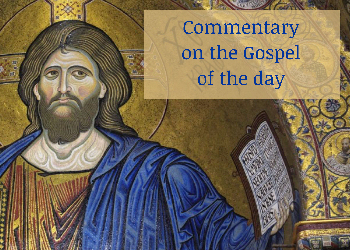Whoever receives the one I send
THURSDAY 7 MAY (Jn 13,16-20)
It is fair to ask: when does a person that welcomes the one Jesus will send welcome Jesus and, in welcomed Jesus, welcome the Father? The answer is offered by Jesus himself, in the Upper Room, after his glorious resurrection: “On the evening of that first day of the week, when the doors were locked, where the disciples were, for fear of the Jews, Jesus came and stood in their midst and said to them, “Peace be with you.” When he had said this, he showed them his hands and his side. The disciples rejoiced when they saw the Lord. (Jesus) said to them again, “Peace be with you. As the Father has sent me, so I send you.” And when he had said this, he breathed on them and said to them, “Receive the holy Spirit. Whose sins you forgive are forgiven them, and whose sins you retain are retained” (Jn 20,19-23). If the missionary wants that by welcoming his person, Jesus is welcomed and in Jesus, the Father is also welcome; like Jesus, he must show that there is full communion of obedience. As Christ is obedient to the Father, so the disciple is obedient to Christ. The truth of obedience is given by the truth of love.
Here is the truth of Jesus’ love and here is also his commandment: “So when he had washed their feet (and) put his garments back on and reclined at table again, he said to them, “Do you realize what I have done for you? You call me ‘teacher’ and ‘master,’ and rightly so, for indeed I am. If I, therefore, the master and teacher, have washed your feet, you ought to wash one another’s feet. I have given you a model to follow, so that as I have done for you, you should also do. Amen, amen, I say to you, no slave is greater than his master nor any messenger greater than the one who sent him. If you understand this, blessed are you if you do it. Amen, amen, I say to you, whoever receives the one I send receives me, and whoever receives me receives the one who sent me.” When he had left, Jesus said, “Now is the Son of Man glorified, and God is glorified in him. (If God is glorified in him,) God will also glorify him in himself, and he will glorify him at once. My children, I will be with you only a little while longer. You will look for me, and as I told the Jews, ‘Where I go you cannot come,’ so now I say it to you. I give you a new commandment: love one another. As I have loved you, so you also should love one another. This is how all will know that you are my disciples, if you have love for one another” ” (Cf. Jn 13,1-35). Love is the sign of truth.
Amen, amen, I say to you, no slave is greater than his master nor any messenger greater than the one who sent him. If you understand this, blessed are you if you do it. I am not speaking of all of you. I know those whom I have chosen. But so that the scripture might be fulfilled, ‘The one who ate my food has raised his heel against me.’ From now on I am telling you before it happens, so that when it happens you may believe that I AM. Amen, amen, I say to you, whoever receives the one I send receives me, and whoever receives me receives the one who sent me.”
St. Paul asks the Christians of his communities for this love: “We cause no one to stumble in anything, in order that no fault may be found with our ministry; on the contrary, in everything we commend ourselves as ministers of God, through much endurance, in afflictions, hardships, constraints, beatings, imprisonments, riots, labors, vigils, fasts; by purity, knowledge, patience, kindness, in a holy spirit, in unfeigned love, in truthful speech, in the power of God; with weapons of righteousness at the right and at the left; through glory and dishonor, insult and praise. We are treated as deceivers and yet are truthful; as unrecognized and yet acknowledged; as dying and behold we live; as chastised and yet not put to death; as sorrowful yet always rejoicing; as poor yet enriching many; as having nothing and yet possessing all things!” (2Cor 6,3-10). When the missionary presents himself with this love, he cannot but be from Christ. When one is from the fullness of the love of Christ, he is also from the fullness of his truth. Jesus is from the perfection of the Father’s love. He cannot fail to be from the perfection of the divine truth. Whoever welcomes him, welcomes the Father who sent him. So it is with the disciple. He is from the perfection of love and truth. Whoever welcomes him welcomes Jesus.
Mother of God, Angels and Saints, make us from the love of Jesus to be from his truth.





